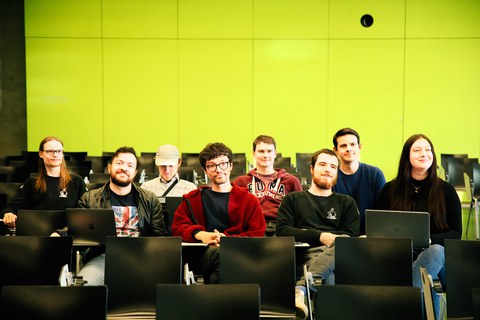Diplom Degree Program Computer Science (2025)
Table of contents
Goals
IT is everywhere: technologies such as data analytics, robotics, machine learning and computer vision are shaping our future. A modern, high-performance IT infrastructure is a must for every company today, and software can be found in almost every device - from washing machines to autonomous vehicles.
Computer science creates the conditions for digital transformation. In this lively and versatile scientific discipline, you will learn all about digital information, its systematic processing, storage and transmission. Computer science seeks suitable structures and methods to develop complex and intelligent systems and to design them efficiently and securely.
The Computer Science degree program at the University of Excellence Dresden is an alternative to the Bachelor's/Master's degree and offers you a number of advantages. The continuous course of study includes a six-month work placement, which enables you to spend time abroad. In addition, you can choose from the wide range of courses offered by our comprehensive university in other subject areas in the "Non-Computer Science Supplement" and thus open up new areas of knowledge for interdisciplinary tasks.
Whether you decide to work in the university sector or in research-oriented industrial laboratories after your studies, we will qualify you to work in interdisciplinary teams and introduce you to scientific methods.
As the largest semiconductor location in Europe, as an AI metropolis and with over 400 software and IT companies, Dresden offers you ideal conditions to gain a deep insight into this booming industry during your studies.
Structure and content
The diploma course in Computer Science comprises 10 semesters including a one-semester work placement or internship abroad. Structurally, the course is divided into two areas - the foundation course, which concludes with the intermediate diploma and teaches you the basics of computer science, and the advanced course, which offers you individual design options with an increasing focus on research and concludes with the diploma.
In addition to mathematics, the foundation course covers the analysis, design and implementation of information processing systems and examines their static structure and dynamic behavior. You can put the theoretical foundations you have learned to the test in the first semester in the RoboLab introductory internship. Here you will work in a team to develop applications for a robot and gain your first project experience. In the hardware internship, you will get to know different circuits. During the software technology project in the fifth semester, you will acquire practical and engineering knowledge for the implementation of software projects.
In the main study program, you can choose from the diverse research areas of our faculty for your future orientation. Here you will become an expert and choose from the following subject areas according to your interests:
- Theoretical Computer Science and Symbolic Artificial Intelligence: formal modeling and analysis as well as algorithmic treatment of models, construction and programming of intelligent systems
- Software Technology and Programming Languages: design patterns, software management, compiler construction and compiler design
- Secure Computing: fundamentals of data security, cryptography and confidential computing
- Systems Architecture: fundamentals of operating systems, databases, data science, structure and properties of computer networks and systems engineering
- Cyber Physical Systems: Design and control of application systems in industrial communication and traffic engineering
- Visual Computing and Machine Learning: Fundamentals of visualization techniques and machine learning
- Human-Computer Interaction and Interactive Media: Multimodal user interfaces, immersive media and advanced multimedia interaction
- Computer Engineering and High Performance Computing: Fundamentals and structure, design and efficient use of technical realizations of computer systems, embedded systems as well as parallel and high-performance computing
In addition to a sound technical education in computer science, you will acquire key skills such as teamwork, communication and languages, which will prepare you for professional life.
Graduation
If you pass the diploma examination, you will be awarded the academic degree "Diplom-Informatiker" or "Diplom-Informatikerin" (Dipl.-Inf.).
Study requirements
The prerequisite for admission to the course is the general higher education entrance qualification (Abitur) or a comparable higher education entrance qualification.
The course begins in the winter semester. Applications must be submitted by September 15 of each year via the online application of the Admissions Office or the International Office.
The degree program is taught in German. Accordingly, we ask international applicants and German applicants with a foreign university entrance qualification to consult the website for information on the required language skills.

